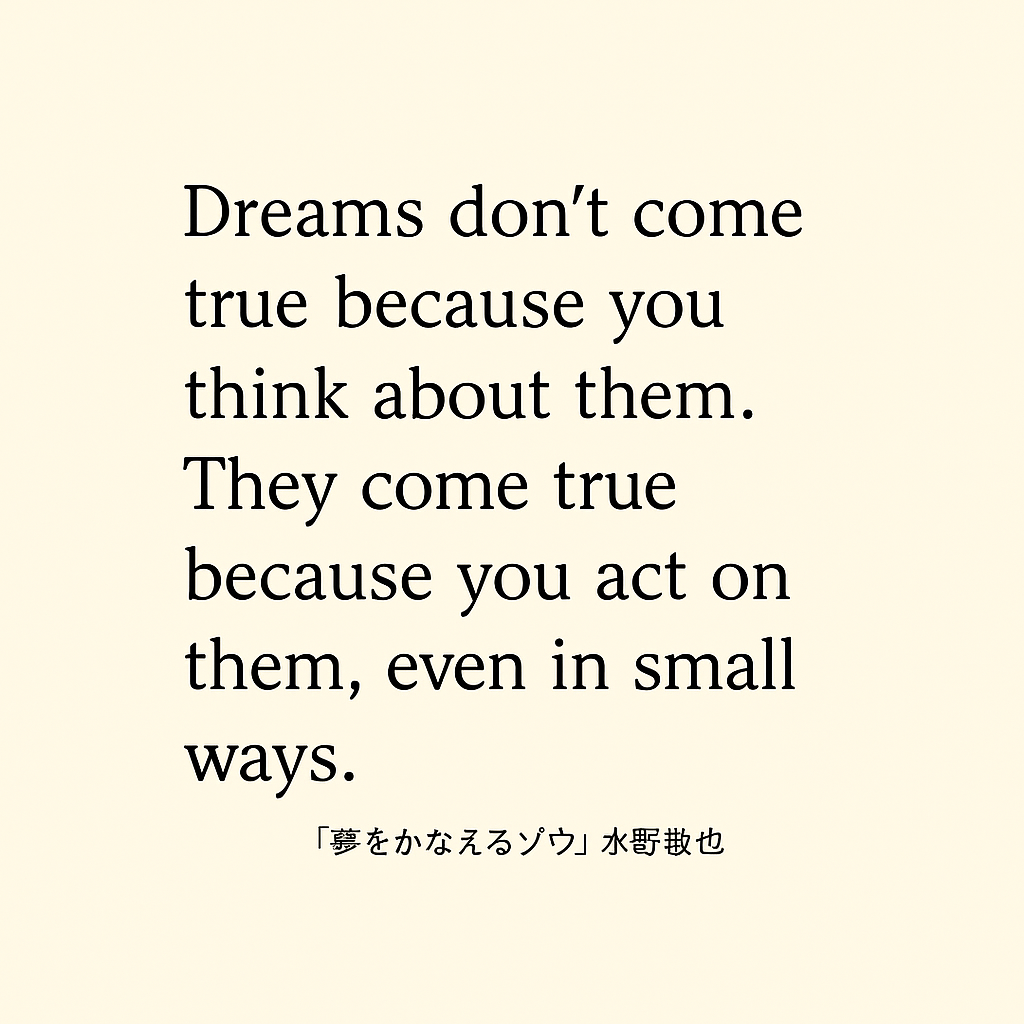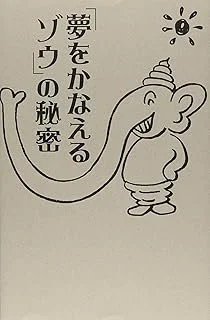The Elephant's Big Dream: Why Your TOEIC Goal is Not Your Problem
Your big TOEIC goal is paralyzing you. Inspired by The Elephant Who Grants Wishes, discover how to break the Over Thinker Block by turning your big dream into a single, small daily task. Learn how stacking tiny victories is the real secret to achieving a high score.
ゾウの大きな夢:あなたのTOEIC目標は問題ではない
“My goal is too big… I don’t know where to start.”
You want a high TOEIC score.
You dream of changing jobs, studying abroad, or proving your skills.
But every time you sit down to study, that big goal feels like a heavy weight.
You think:
“I need a perfect study plan.”
“I need to figure out the fastest way.”
“I need to fix everything at once.”
And you end up doing… nothing.
If this is you, you’re stuck in The Over Thinker Block.
The Over Thinker Block — Paralyzed by The “Perfect Plan” Illusion
The Over Thinker Block happens when you believe you need to solve the entire TOEIC problem before you can start.
You over-plan, over-analyse, over-worry.
You’re so busy thinking about the mountain, you never take the first step.
Ganesha’s Lesson: Big Dreams Are Built from Small, Repeated Actions
In The Elephant Who Grants Wishes, Ganesha teaches the main character that dreams don’t come true by making perfect plans.
They come true by doing small tasks, over and over.
Want to be rich?
Start saving 100 yen a day.
Want to be successful?
Start greeting people properly.
Dreams are not achieved through big, dramatic actions.
They’re built from small habits that compound over time.
MTC’s Truth: Your TOEIC Goal is Fine — Your Focus is What’s Broken
You don’t need to lower your TOEIC goal.
You don’t need to have it all figured out.
The problem is where you’re focusing.
At MTC, we teach this:
Stop thinking about the 600+ score.
Start thinking about the 1 action you can take today.
That’s where progress starts.
ALT Habit: Break The Goal into a One-Today Task
Here’s a practical way to stop overthinking and start moving.
Write down your TOEIC goal (e.g., “Score 700 in 6 months”).
Under it, write: “What can I do today to move 1% closer?”
Pick one small, specific action (e.g., “Review yesterday’s mistakes for 5 minutes.”)
Do it.
That’s it.
One day. One task. One small win.
Why This Works (Even If You’ve Been “Stuck” for Months)
It removes mental overload. You stop worrying about everything and focus on one thing.
It builds visible momentum. Daily small wins create real progress.
It reduces failure fear. You’re not betting on “big efforts” — you’re stacking tiny victories.
Big Dreams Are Not Achieved — They Are Built, Brick by Brick
You don’t need a perfect plan.
You don’t need to solve everything today.
You need a system where small actions build into big outcomes.
The Elephant doesn’t grant wishes with magic.
He grants them with habits.
Start with one small action today.
That’s how big dreams become real.
Want to Learn More?
Our blog is full of practical strategies that help test-takers like you build better habits, overcome common blocks, and improve TOEIC scores through smarter, easier methods. Try our free TOEIC Block quiz now!
Listen Like an Elephant: The Secret to Going from Passive to Active
Do you listen to TOEIC audio but remember nothing? You're stuck in the Passive Listener Block. Discover Ganesha's lesson from The Elephant Who Grants Wishes and learn the "Listen for Just One Keyword" habit to shift from passive to active listening and finally make progress.
ゾウのように聴く:受け身のリスニングから卒業する方法
“I listen, but nothing sticks.”
Sound familiar?
You sit down to do a TOEIC Listening drill.
You press play.
You hear the words.
But when the question ends, your mind is blank.
You think:
“I was listening. Why didn’t I catch anything?”
If this is you, you’re not bad at listening.
You’re stuck in The Passive Listener Block.
The Passive Listener Block — Hearing Everything, Remembering Nothing
Many learners believe that “listening practice” means… just listening more.
But passive listening is like driving on autopilot.
Your ears are on, but your brain is not processing.
This is the Passive Listener Block.
It’s not about how much you listen.
It’s about how you listen.
Ganesha’s Lesson: Be Present, Not Perfect
In The Elephant Who Grants Wishes, Ganesha teaches that real change happens when you are present.
The tasks he gives are simple, but they require full attention.
For example:
When you greet someone, don’t just say “Hello.”
Notice their expression. Their mood. Their reaction.
It’s not about saying perfect words.
It’s about being aware and intentional.
Listening is the same.
MTC’s Truth: TOEIC Listening Is Not a Passive Skill — It’s Active Work
The biggest TOEIC listening mistake?
Thinking you can “absorb” English just by playing audio.
At MTC, we teach that listening is active decision-making.
Your ears hear.
But your brain must choose:
What am I listening for?
That’s the switch from passive to active.
ALT Habit: Listen for Just One Keyword
Here’s a simple way to practice active listening — without getting overwhelmed.
Play a TOEIC Part 3 or Part 4 audio clip.
Decide on one keyword you will listen for (e.g., “schedule,” “problem,” “reservation”).
Play the audio and focus only on that word.
When you catch it, pause and note: What was the situation?
That’s it.
One keyword.
One clear focus.
Why This Works (Even If You’ve “Listened” a Million Times Before)
It forces your brain to make a decision. You’re not just hearing — you’re searching.
It builds focus muscle. Catching one word trains you to process, not just hear.
It creates small wins. Each success tells your brain: “I can do this.”
Stop “Listening More.” Start “Listening Smarter.”
You don’t need to double your study hours.
You don’t need new materials.
You need a new way of listening.
One keyword.
One focus point.
One habit that shifts you from passive to active.
The Elephant wouldn’t tell you to work harder.
He’d tell you to pay attention.
Want to Learn More?
Our blog is full of practical strategies that help test-takers like you build better habits, overcome common blocks, and improve TOEIC scores through smarter, easier methods. Try our free TOEIC Block quiz now!
The Elephant Who Grants Wishes: The Smallest Habit You Can Start Today
Burnout isn't a sign of laziness; it's a sign your study system is too heavy. Discover Ganesha's first lesson from The Elephant Who Grants Wishes and learn the "one Part 2 question" habit that builds momentum, resets your brain, and helps you conquer the Burnout Block.
夢をかなえるゾウの教え:今日から始める、一番小さな習慣
Are you too tired to even start studying TOEIC?
You know you should study.
You want to improve.
But just thinking about TOEIC makes you sigh.
The textbooks are too thick.
The practice tests feel endless.
Even opening your study app feels like climbing a mountain.
If this sounds familiar, you're not lazy.
You’re stuck in The Burnout Block.
The Burnout Block — When Even Small Effort Feels Too Much
The Burnout Block happens when your brain has hit its limit.
You’ve worked hard before. You’ve failed, or made little progress.
Now, your mind protects itself by saying:
“Why bother?”
Traditional study methods make this worse.
They demand big effort. Big willpower. Big plans.
But if you’re in Burnout, these only make you shut down.
Ganesha’s First Lesson: Start with a Task So Small You Can’t Fail
In The Elephant Who Grants Wishes, the god Ganesha gives the main character a simple challenge:
“Shine your shoes.”
It’s not about shoes.
It’s about creating momentum with a task so small, it’s impossible to fail.
Success isn’t about working harder.
It’s about starting smaller.
MTC’s Truth: You’re Not Broken — Your System Is Too Heavy
Most TOEIC learners think they need to “try harder.”
That’s wrong.
The problem isn’t you.
It’s the size of the first step.
MTC’s approach is different:
We give you a habit so small, you don’t need motivation.
ALT Habit: Listen to Just One Part 2 Question a Day
That’s it.
One question.
No willpower. No plan. No guilt.
Here’s how you do it:
Open any TOEIC Part 2 audio file.
Play one question.
Pause and think: “How would I answer this?”
Done.
Why This Works (Even If You Feel Dead Inside)
It’s too small to fail. You don’t need to “feel ready” — just press play.
It builds daily momentum. One question today makes two questions tomorrow easier.
It resets your brain’s belief. You’re no longer someone who “isn’t studying.” You’re in motion.
You Can’t Fix Burnout with Big Effort — But You Can with Small Successes
Your dream of a high TOEIC score isn’t dead.
It’s just buried under bad study systems.
You don’t need a new textbook.
You don’t need a perfect schedule.
You need one question.
One small win.
One habit that makes you feel:
“I did something today.”
Start there.
The Elephant would approve.
Want to Learn More?
Our blog is full of practical strategies that help test-takers like you build better habits, overcome common blocks, and improve TOEIC scores through smarter, easier methods. Try our free TOEIC Block quiz now!



